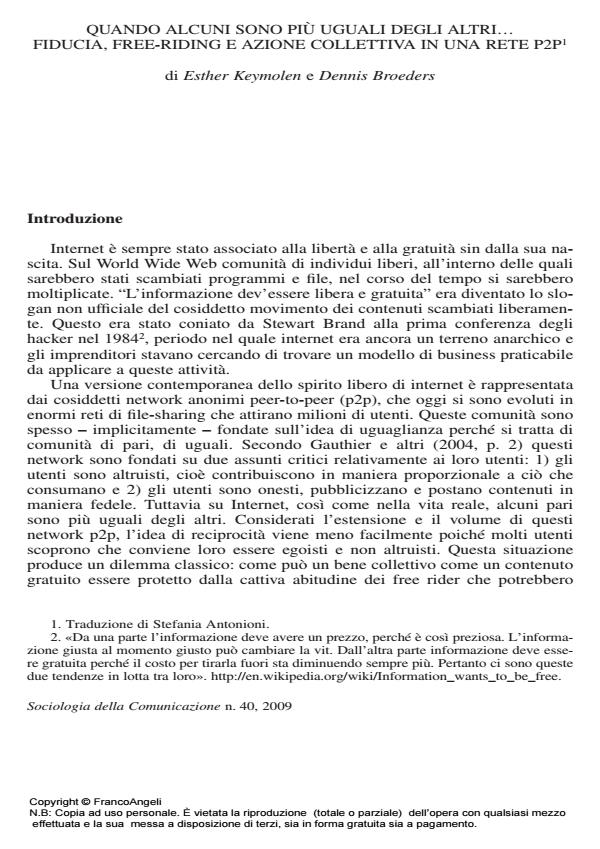When some are more equal than others.. Trust, free riding and collective action in a P2P network
Journal title SOCIOLOGIA DELLA COMUNICAZIONE
Author/s Esther Keymolen, Dennis Broeders
Publishing Year 2010 Issue 2009/40
Language Italian Pages 19 P. 90-108 File size 682 KB
DOI 10.3280/SC2009-040008
DOI is like a bar code for intellectual property: to have more infomation
click here
Below, you can see the article first page
If you want to buy this article in PDF format, you can do it, following the instructions to buy download credits

FrancoAngeli is member of Publishers International Linking Association, Inc (PILA), a not-for-profit association which run the CrossRef service enabling links to and from online scholarly content.
Current expressions of the Internet ‘s free spirit are represented by the so-called anonymous peer to peer (p2P) networks, which have evolved today into huge file-sharing networks attracting millions of users. These communities are often founded on an egalitarian idea, as they are peer communities. However on the web, as in real life, some peers are more equal than others. If we consider both the extent and the space occupied by these p2p networks, the idea of mutuality often fails, because many users realize that it is better to be selfish than unselfish. The paper focuses particularly on the LimeWire: an advanced and very popular free peer-topeer file sharing program that uses the Gnutella network. The paradox that underpins this, like other p2p networks, is how they depend for their success on small groups of people that supply their own files against larger groups that use these files without sharing their ones. A theoretical topic for discussion is then the trust as a system. The paper analyses the free riding problem through the LimeWire Forums, where through self-analysis the members discuss whether some rules have to be introduced or not, in order to improve the working of the network. In particular, the community suggests three different positions: first the so called do ut des users i.e. those that are open to more rules; second, the so-called "information must be free" users requiring no further, heavy rules, but rather preferring that a moderator of the LimeWire faces opportunists; third the LimeWIre vision as expressed by the forum moderator. This is a key role for the company, and more generally for the appraisal of the phenomenon, because he expresses the chance to trust the system and this corresponds to the need to connect as many users as possible to the p2p network regardless of their point of view, in order to safeguard the profitability of the network.
Esther Keymolen, Dennis Broeders, Quando alcuni sono più uguali degli altri.. fiducia, free-riding e azione collettiva in una rete p2p in "SOCIOLOGIA DELLA COMUNICAZIONE " 40/2009, pp 90-108, DOI: 10.3280/SC2009-040008